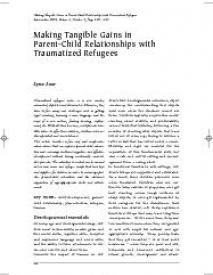Making Tangible Gains in Parent-Child Relationships with Traumatized Refugees
Traumatized refugees arrive in a new country exhausted, depleted and disoriented. Moreover, they have to face many new challenges such as getting legal residency, learning a new language and the ways of a new culture, finding housing, employment, etc. With all these burdens, most parents have little solace to offer their children, children who are also uprooted and overwhelmed. This article describes a few easy and inexpensive interventions that can improve parent-child interaction and encourage children’s cognitive and affective development without taxing emotionally unavailable parents. The activities described can be carried out in war zones and refugee camps that lack toys and supplies for children in order to encourage positive parent-child interaction and the children’s acquisition of age-appropriate skills and attachments.
Geachte bezoeker,
De informatie die u nu opvraagt, kan door psychotraumanet niet aan u worden getoond. Dit kan verschillende redenen hebben,
waarvan (bescherming van het) auteursrecht de meeste voorkomende is. Wanneer het mogelijk is om u door te verwijzen naar de bron
van deze informatie, dan ziet u hier onder een link naar die plek.
Als er geen link staat, kunt u contact opnemen met de bibliotheek,
die u verder op weg kan helpen.
Met vriendelijke groet,
Het psychotraumanet-team.
Reference:
Lynn Loar | 2004
In: Intervention: the international journal of mental health, psychosocial work and counselling in areas of armed conflict, ISSN 1571-8883 | 2 | 3 | 210-220
http://www.interventionjournal.com/sites/default/files/210_220_Loar.pdf
In: Intervention: the international journal of mental health, psychosocial work and counselling in areas of armed conflict, ISSN 1571-8883 | 2 | 3 | 210-220
http://www.interventionjournal.com/sites/default/files/210_220_Loar.pdf


